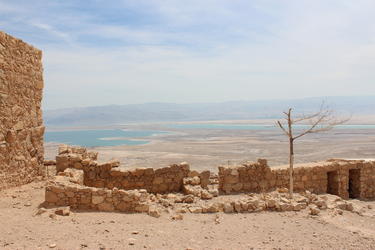The idea of going consciously to heaven at death seems comforting. But does that make it true? The Bible's answer may astonish you!

How does Jesus Himself describe death? He simply compares it to sleep.
Source: Medioimages/Photodisc/Thinkstock
Funerals are sad experiences. It's heartbreaking to pay your final respects to someone you knew and loved.
Perhaps you've had to say farewell to a mother or father, laid to rest a brother, sister or perhaps say goodbye to a spouse or best friend. Have you wondered:
What's happened to them? Where have they gone? Why do I doubt?
You may feel unexpected emotions such as shock and disbelief—making it difficult to accept what's happened.
You desperately want to know the truth. Supposing the person is safe and looking down from heaven is just not enough. You're skeptical, not completely satisfied with mere speculation. And you think:
What about me? What will happen to me when I die?
You need to know what God has said. Is there a sure word from Him that will help you?
Going to heaven at death—truth or empty hope?
Sometimes you have a need to believe, especially at those times in life that force you to think about your mortality. We all know that in the end no one beats death. But it's one thing to know it in the back of your mind, and something else to come face to face with it.
When you're looking in the face of death, the idea of heaven can seem comforting. It can seem beautiful—but does that make it true? Is it just wishful thinking, or can you know the facts? Is it just a matter of faith?
Now here's what may be surprising: What the Bible says about death and heaven is probably quite different from what you may think you know or what you believe.
So how can you be sure of what you believe? The majority of Americans and Britons still believe in life after death. According to a Gallup poll, 81 percent of Americans and 55 percent of Britons say they believe in going to heaven.
We want to believe that our loved ones who have died are okay and that we'll be okay. So surveys show that most people are confident, or at least they have a feeling, that life doesn't end at the grave.
Only Jesus has gone to heaven
How would you answer this question: Where do your ideas about heaven come from? Most Christians would say they come from the Bible. Yet some have an image of floating on clouds. Some believe they'll be given wings like angels. Others believe that they'll gaze into the face of God for eternity.
Yet did you know that none of these are what the Bible actually says is in store for us? None of these are ideas that God has given us in the pages of His Word. It's time to examine your concept of death and your belief in going to heaven!
Don't just believe what someone else has said, or what a Sunday school teacher may have taught you, or what a church or religion says, or what this article says. Why not? If it's not based on the truth, what good is it? So don't believe any person's opinion—believe your Bible! You must believe
what God says in the pages of His Word. That's the challenge today. Are you willing to look at what Scripture actually teaches? That's where our understanding of life and death must come from—the Word of God!
Notice what is stated in
John:3:13 (emphasis added throughout):
"No one has ascended to heaven but He who came down from heaven" —and that one Being is Jesus Christ, who has returned to heaven!
Now that may be startling to you—but the Bible here is clear and plain. How does what it teaches here compare with what you've thought was true? If you look in the New International Version, it renders the statement as,
"No one has ever gone into heaven." The Message says,
"No one has ever gone up into the presence of God." God's Word Translation says,
"No one has gone to heaven." The only exception is Jesus Christ Himself!
Jesus' disciple Peter echoed this sentiment in Acts 2: "Men and brethren, let me speak freely to you of the patriarch David, that he is both dead and buried, and his tomb is with us to this day . . .
For David did not ascend into the heavens" (
Acts:2:29,
Acts:2:34).
So Jesus' disciples did not teach that life beyond the grave meant going to live forever in heaven. Jesus Himself never promised that Christians would go consciously to heaven at death!
Hebrews 11, speaking of great men and women of faith of past ages, tells us that they are still awaiting their future reward of being made perfect in God's Kingdom: "And all these, having obtained a good testimony through faith,
did not receive the promise . . . that they should not be made perfect apart from us" (
Hebrews:11:39-40).
Death compared to sleep—that is, temporary
So why haven't they yet received the promise of eternal life? And if they aren't in heaven, where are they?
When Jesus' friend Lazarus died, Christ's reaction was very telling. Jesus Himself said, "'Our friend Lazarus
sleeps, but I go that I may wake him up.' Then His disciples said, 'Lord, if he sleeps he will get well.' However,
Jesus spoke of his death, but they thought that He was speaking about taking rest in sleep. Then Jesus said to them plainly, 'Lazarus
is dead'" (
John:11:11-14).
That tells us something important. How does Jesus Himself describe death? He doesn't say that people who died immediately went to heaven or hell at death. He simply compares it to
sleep.
So let's think of that comparison for a moment. When someone is in a deep sleep, they have no awareness of the passing of time or any knowledge of events that are occurring while they're asleep. It's like they're unconscious. They're oblivious to circumstances. So throughout the Bible, we see that it describes the dead as figuratively in a state of sleep. They're unaware. They're waiting in the grave.
King Solomon confirmed the fact that death is like a deep, unconscious sleep: "Whatever your hand finds to do, do it with your might;
for there is no work or device or knowledge or wisdom in the grave where you are going" (
Ecclesiastes:9:10). Just before that he wrote, "For the living know that they will die;
but the dead know nothing" (
Ecclesiastes:9:5).
So it becomes clear that the Bible consistently teaches that good people don't go to heaven or anything like heaven at death—instead they sleep in the grave.
All of the dead—the good and the not-so-good alike—
wait in the grave.
Now that's quite a change in perspective! We don't have to be overwhelmed and consumed by grief because we're told that even in death there is hope. As the apostle Paul wrote in
1 Thessalonians:4:13, "I do not want you to be ignorant, brethren,
concerning those who have fallen asleep, lest you sorrow as others who have no hope." So instead of the chilling thought of our loved ones having ceased to be, we're told that we can be comforted. We can be encouraged by thinking of them as being asleep in Christ!
A greater promise than heaven as commonly imagined
Think of the common concept of heaven. Supposedly heaven is where you, your best friends and your relatives go after you die. Many believe that their departed family members are looking down on them from paradise.
But if so, have you ever wondered what that paradise would really be like? Would it really be a place of perfect happiness? Would it really be a place of ideal joy and bliss? Imagine if it were true: How could it really be heavenly?
Imagine if you were in heaven, looking down and seeing this world. What would you see? You'd see a world of pain. You'd see a world of war and grief. Imagine watching your loved ones—seeing their shortcomings, seeing their blunders, watching them go through terrible trials, seeing their sinful acts—witnessing a world of evil! Would that be paradise?
No. That would be torture and misery. Rather than some dreamy paradise, it would be your worst nightmare!
The Bible reveals a much greater truth and fate for those who die. Let's see again what Jesus Himself taught.
Since the dead are waiting in the grave as if asleep, what are they waiting for? When and how will they be awakened from that sleep?
The answer to that question is one of the great revelations of Scripture. God's promise of the resurrection of the dead truly brings us hope. It is not just a resurrection to life, but to a life of meaning and purpose with Jesus Christ here on earth, ruling for a thousand years (
Revelation:20:4). This all begins with the return of Christ, at which point His faithful followers are resurrected (
1 Thessalonians:4:16).
The Old Testament patriarch Job understood the gravity and full meaning of this future resurrection. Notice what he said in
Job:14:14: "If a man die, shall he live again? All the days of my appointed time will I wait,
till my change come" (King James Version). Job understood that he would one day be resurrected.
Even more importantly, he understood that a
change would occur. This same change is described by Paul in 1 Corinthians 15 as a change from mortality to immortality—from physical, mortal flesh to immortal, glorified spirit. That is what the coming resurrection of the dead in Christ is all about—not an aimless eternity in heaven, but a real change to becoming like Jesus Christ (
1 John:3:2).
Change your life now to be part of the change at the resurrection
This is the wonderful truth of God's plan for His people. It's God's purpose for your life. The Bible speaks clearly of a resurrection and a change from physical life to spiritual life. Understanding how one can have a part in that resurrection is so very important to having an understanding of what our life today is about and certainly a genuine hope for the future.
It tells us
how we need to live right now. Our understanding of and belief in God's plan should make a difference in who we are and how we live our lives. Jesus clearly showed us what our priorities in life should be: "Seek first the kingdom of God and His righteousness" (
Matthew:6:33).
When you look to the truth of the Word of God instead of human tradition,
you can have hope. You see that death, like sleep,
is not permanent. You see that there will be an awakening and a change to an incorruptible life with Jesus Christ as your King!
This beautiful picture of the future is not a figment of your imagination. It comes directly from the Bible—the Word of God.
When you look to the one true source, the source of all things, you find incredibly good news. The time will come when the dead in Christ will be resurrected from sleep to immortal life at Jesus Christ's return to earth.
So be faithful. Look forward to His return!






